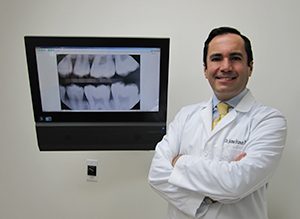The Risks and Complications of Dental Implants in North Miami Beach, FL
The Success of Dental Implants
Dental implants are renowned as the top choice for tooth replacement because they closely resemble the structure of natural teeth. Generally, the success rate of dental implants is high, with research indicating that up to 95% of implants are successful over the long term. However, like any surgical procedure, there are risks and potential complications involved.
Though complications are uncommon, it’s crucial to be aware of them. We always advise reaching out to our North Miami Beach, FL dentist immediately if you notice anything unusual during your implant treatment or recovery period. Call 305-945-0909 to learn more from Dr. Abbo.
Dental Implant Risks
Infection
As with any surgical procedure, there’s a risk of infection following dental implant surgery. Infections can occur at the implant site, in the surrounding gum tissue, or in the bone supporting the implant. Symptoms might include pain, swelling, redness, and pus. If you notice any of these signs, it’s important to contact your dentist immediately.
Dental Implant Failure
Implant failure happens when the implant fails to integrate properly with the surrounding bone or becomes loose over time. This can be due to various reasons, such as improper placement, poor oral hygiene, or insufficient bone density. Sometimes, dental implant failure necessitates the removal and replacement of the implant.
Nerve or Tissue Damage
Nerve or tissue damage can occur during the placement of dental implants. Nerve damage may result in pain, discomfort, numbness, or tingling in the lips, tongue, or chin. Tissue damage can lead to inflammation, bleeding, or infection. These issues can arise from improper implant placement, poor oral hygiene, or insufficient bone density.
Sinus Problems
In some instances, dental implants placed in the upper jaw bone can extend into the sinus cavity, leading to sinus problems such as sinus infections or sinusitis. This is more likely if there’s not enough bone to support the implant.
Allergic Reaction
Some individuals may experience an allergic reaction to the materials used in dental implants, such as titanium or other metals. Symptoms might include itching, rashes, or even severe cases of anaphylaxis.
 Risk Factors
Risk Factors
Several risk factors can increase the likelihood of complications from dental implant surgery. These factors contribute to dental implant problems:
- Poor oral health: Existing dental issues like gum disease or tooth decay can heighten the risk of complications during and after dental implant surgery.
- Insufficient bone density: Dental implants require a strong bone foundation for support. Lack of sufficient jawbone can increase the risk of early implant failure.
- Smoking: Smoking can impede the healing process and raise the risk of implant failure.
- Medical conditions: Conditions such as diabetes, autoimmune disorders, or cancer can elevate the risk of complications during dental implant surgery.
- Medications: Some medications, like blood thinners, can increase the risk of bleeding during and after the procedure.
- Age: Older adults may face a higher risk of complications from dental implant surgery due to age-related changes in bone density and healing.
Dental Implant Complications
Complications that may arise after receiving dental implants include:
- Loosening or shifting of the implant: Over time, the implant may become loose or shift in the jaw, causing discomfort or negatively impacting the implant’s appearance.
- Peri-implantitis: A type of periodontal disease that can occur around the implant. It’s caused by bacterial infection, and if untreated, it can lead to bone loss and implant failure.
- Implant fractures: Like natural teeth, dental implants can fracture due to trauma, overloading, or poor bone quality.
Always follow the instructions provided by our dentist to minimize the chances of complications developing.
 Reducing Your Risk of Complications
Reducing Your Risk of Complications
Although there’s always some risk with any surgical procedure, you can take steps to minimize the risk of complications from dental implant surgery:
- Choose a qualified and experienced dentist: It’s essential to select a dentist experienced in implant dentistry and dental implant surgery. Ensure they have a good success record with surgical procedures.
- Maintain good oral hygiene: Brush and floss your natural teeth and implants regularly, and visit your dentist for routine cleanings and checkups.
- Follow your dentist’s post-surgery instructions: Our dentist will provide specific instructions on caring for your implant after surgery. Adhering to these instructions is crucial for proper healing.
- Avoid smoking as it can interfere with the healing process and increase the risk of implant failure.
Frequently Asked Questions
What can I do if I experience complications or problems with my dental implant?
If you experience complications or problems with your dental implant, contact your dentist or oral surgeon as soon as possible. They can evaluate the issue and determine the best course of action, which may include additional surgery or the replacement of the implant.
How can I reduce the risk of infection after the implant procedure?
To reduce the risk of infection after the implant procedure, it’s essential to maintain good oral hygiene by brushing and flossing regularly and following your dentist or oral surgeon’s instructions for post-operative care. Avoiding smoking and excessive alcohol consumption can help reduce the risk of infection.
Can my body reject a dental implant?
It’s rare for the body to reject a dental implant, as they’re typically made from materials that are biocompatible and safe for use in the human body. However, there are some cases where the body may reject a dental implant.
Can anyone get a dental implant?
In general, most people are good candidates for a dental implant as long as they have good oral health and sufficient bone density to support the implant. However, certain medical conditions or medications may affect your eligibility for dental implants.
What is the most common cause of dental implant failure?
When a dental implant fails, it’s most often caused by osseointegration failure. This occurs when the implant post doesn’t fuse properly with the surrounding bone. Osseointegration may fail because of:
- Poor oral hygiene
- Inadequate bone density
- Improper implant placement
- Overloading
- Medical conditions
Achieve Your Best Smile With Dental Implants
While some risks and complications can occur with dental implants, they’re rare. With a 95% success rate, most patients achieve beautiful smiles and excellent oral health with dental implants. Call our North Miami Beach, FL, office today at 305-945-0909 to schedule an appointment. We proudly serve patients in North Miami, Aventura, and West Park.

